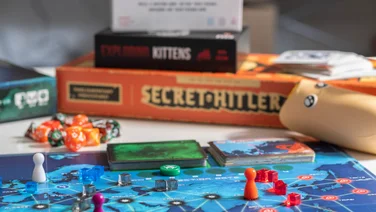To help us provide you with free impartial advice, we may earn a commission if you buy through links on our site. Learn more













There are only four elements to any video game ever written. And those four elements are chess, dice, ping-pong and bunkum. Every blood-soaked shoot-em-up, all swords-and-sorcery twaddle, each adventure game and sports simulation, everything and anything that passes for computer gaming is a combination of these elements.
Which means that the video games industry, the biggest entertainment industry the world has ever known, is nothing more than a repackaging scam. In which case it also means that video games players are shelling out good money for the same old experiences. All video games are the regurgitated ingredients of the strategies of chess, the throw of the dice, the hand-eye coordination of ping-pong and the gimmickry of bunkum.
Who says so? I say so. Who am I? I’m the founder of the British computer games industry. The guy who started it all. So step aboard my time machine and join me as we go back to the future …
EARLY DAYS
I founded my games company on November 19th 1977. It was called Automata. Back then I was creating stuff for a target audience that didn’t really exist. Everyone was talking about computers, but hardly anyone actually owned one. Ever since I programmed my first machine way back in the 1960s I had reckoned that computers were not for their advertised purposes of scientific research or office drudgery, but were a brand new way for people to play games, and all I had to do was find those people to make a living.

The original 1977 Automata team, left-to-right, Robin Evans (art and design), Mark Bardell (words and marketing), Mel Croucher (making things up), Christian Penfold (sales and coding), Silas Minkey (technical stuff)
The trouble was, in 1977 the UK video games industry was restricted to Space Invaders machines in pubs, usually plugged in to the spare power socket by the toilets, and I didn’t fancy hanging around near the khazi, asking people if they were interested in playing with my software.
There were no specialist magazines to advertise in, or even shops selling computers, only a small bunch of enthusiasts who had yet to cohere into a gaming community. The rudimentary lines of code for early games changed hands as typed listings, which I found very boring indeed. So I got the notion to reach out to the nation’s games players via radio, and force-feed them some ready-mades.
We broadcast my first on-air video game in the wee small hours of December 15th 1977, on the 257FM waveband of Radio Victory, a commercial radio station based in Portsmouth. In later broadcasts we also used the 1170AM waveband.
Either way, an audio signal carrying computer data sounds like your radio set is having a seizure, so we had to top and tail the coded signals with an enticing prize competition to try and stop the audience switching off those bizarre nocturnal emissions. And so the concept of the prize computer game was born.
It was hard work for the newly computer-savvy radio listener. First of all they had to stay up until way past bedtime and record the signal off-air onto cassette. Then they needed to link their cassette player to a home or office computer and play the primitive code so the machine could hum along. After only a minute or two the program would load, and if it had not been corrupted during transmission, clues would appear on screen. Only then could the patient listener play the game, solve the clues, phone up the radio station and make a claim for a crummy little prize.
After the first broadcast we got three responses. But by the end of a season of hit-and-miss transmissions, the number of listeners with access to computers was beginning to grow, and I got a mainstream evening slot sponsored by Whitbread, then manufacturers of the fifth-worst beer in the land. My show was called Whitbread Quiz Time and it was broadcast at an ungodly hour every Thursday night. I produced a hybrid radio pub quiz and on-air computer game. And I found myself midwife to a new industry.
DEVELOPER HUT
When Automata started, our games used one kilobyte of memory each, because home computers didn’t have any more juice, and we duplicated them by hand onto audio cassettes, eight at a time at four times normal speed. Today, my standard mobile phone packs a punch 32 million times more powerful, and the data arrives invisibly through the air. In a perfect world, this would mean that today’s games are 32 million times better than my originals. But, alas, it is an imperfect world.
If you will indulge me to put that into perspective, one of the most popular video games of recent times involves coloured blobs representing Angry Birds attacking coloured blobs representing thieving pigs. The demo version requires 524,288 kilobytes of memory. We didn’t need over half a million of them back in the day, we had to manage with one. Mind you, I admit that we were restricted to monochrome.

Automata games in 1K, complete with stereo soundtracks

Angry Birds demo, in only 524,288K
Before 1981 there were a handful of computer games producers in the land, and we could all fit into one wooden scout hut and share a taxi home. That’s not a metaphor, that’s a memory. In the following year there were still less than a hundred of us, but by the end of 1982 we numbered around 460 souls, with 1,200 titles between us competing for a slice of the market, and the mainstream media had begun to take notice.
As for Automata, our first proper commercial success in video gaming happened by accident in 1981. It was the result of a bulk buy of low-quality C30 audio cassettes used for recording audio guides to tawdry tourist destinations. C30 meant that the recording time available on each cassette was fifteen minutes a side, so I reckoned I could get rid of our stockpile by filling them up with as many games and audio entertainments as possible and flogging them cheap.
The result was a compilation tape called Can Of Worms, packing in eight games and eight comedy tracks for the grand sum of £3. We had no overheads or business sense, and we sold them mail-order-only direct to the players. Oh happy days!
By the time the British home computing boom exploded, Automata had already produced two dozen video games. We were all paid a pittance, plus beer, which was classed as software. We knew next to nothing about programming and even less about marketing, but our competitors knew even less. And the electronic world was our oyster.
THE PARASITES MOVE IN
I don’t know if I invented transmedia or not (that being multiplatform storytelling), but in 1982 I produced something called PiMania. It was released as a video game, two pop music albums, a t-shirt, a comic strip, and a gold and diamond prize for the winner, all of which needed the other elements for maximum participation. Such multimedia events are not uncommon these days (often under the guise of alternate reality games – such as Halo advertising event www.ilovebees.com), but back then they thought I was bonkers.

The PiMan, Automata’s cartoon hero on the 1980s, salutes the future
Nevertheless, the game topped the newly-formed software charts, and some confused people declared it Game Of The Year. And then the unthinkable happened. Home-grown video games companies like mine started to make money. Big mistake!
Larger corporations, particularly traditional media, began to sniff around and muscle in, and soon a chain of parasitic intermediaries attached themselves to our cottage industry. There were legions of agents, producers, lawyers, publishers, accountants, publicists, distributors, wholesalers, and retailers, and each layer effectively distanced any chance of direct transaction between the original game creator and the end-user.
Direct sales fell out of fashion, and self-funding flew out the window. And the cost of video games was forced to rocket to cover all of these new overheads. Well, we all know what happened as a result: in a word, piracy!
The home-copying of video games was incredibly easy, all the time our storage medium was based on the humble audio cassette, and at Automata we reckoned our games were being ripped off at a rate of twenty pirate copies to every legal copy sold. In some territories it happened on an industrial scale, and I have seen my titles in the best-seller charts from Bombay to Berlin – where we never sold a single legal copy.
From the players’ point of view, the stereotypes of video games were already setting in, and it seemed that games funders and designers preferred to follow the mainstream, and not question what they were being asked to produce.
By All Fools Day 1985 it was time for me to move on, and I sold Automata for ten pence to a bloke in a pink romper suit. I thought I would simply hang around and wait a wee while for technology to advance to a point which would allow me to make interactive movies. That wee while lasted more than a quarter of a century! As the machines got faster, and the graphics got better, and the number of players leaped from the tens of thousands to the hundreds of millions, the actual games never seemed to change at all.
And then, just when I thought I would never contemplate making video games ever again, two extraordinary things happened which pitched me right back to the future. Those twin-phenomena were Downloads and Crowd-funding. Players leapt at the chance to download video games direct from the creators straight on to portable devices, and those same players were also given a chance to get involved with funding the production. And as for all the intermediary parasites, it seemed that at long last they were getting squished. Let’s come right up to date and examine what’s happening now, and why I believe we are right back where we started at the dawn of a new golden age in video games creativity.
SHOW ME THE MONEY!
I have a friend who runs a very successful games software company. The amazing views from his glass-walled offices never fail to thrill me when I wander round to drink his coffee and observe his silent legions of young designers and coders. This friend of mine recently invested 150 man-years in a computer game. And after making such an investment, it was decided that the game was not commercially viable, and so it was quietly suffocated with the electronic pillow of abandoned hope. 150 man-years! That’s longer than it takes to get served at my local Co-op on Double Rollover Night.
In the heyday of Automata, we would think up a game in the morning, and have it finished by closing time at the pub. Seeing as we paid ourselves £25 a week and worked out of a room above Dorothy’s Wool Shop, our overheads were modest. Seeing as how it took less than a week to create the artwork, the soundtrack, the advertising and the time to buy some jiffy bags and a sheet of stamps, I’d say that the total development cost of an average early game was around £150. We sold our games mail-order with no intermediaries and direct to our lovely players at computer fairs, all for about a fiver. As our American cousins would say, go figure.
I never heeded anyone’s advice in this business, and I don’t expect anyone to heed any advice from me. Furthermore, I hate to dampen the enthusiasm of the new generation of games-makers, and I know that self-delusion can be a great motivator. But hey guys, and the vast majority of you are guys, you can’t eat pixels, and you can’t pay the rent with them. Last year, of all the hundreds of thousands of commercial video games and gaming apps that made it to market, each one taking weeks and often months to produce, the average revenue generated was less than £200. The National Minimum Wage rate for a twenty-year old is £4.98 an hour. Go figure.
And when you have gone and figured, I invite you to forget the past and embrace the future, because everything has changed once again. And for the better. The financial crash of 2008 not only brought traditional banks into disrepute, it knackered the chances of speculative investment for a generation. And it also gave rise to an online alternative that bypasses traditional financing altogether. It is now possible to discover if a game is liable to be a commercial success before it is even written, by inviting potential players to back a concept themselves via the amazing phenomenon of crowd-funding. And the world leader in crowd-funding is called Kickstarter.
GET YOUR KICKS
Kickstarter is already having a major impact on the future of how video games are brought to market. It does this by getting as many potential players as possible to invest in a game’s chances of success at the concept stage. And it may surprise you to learn that raising the money is not even the most important thing.
The most important thing is the ability to conduct market testing in the real world with real players. If there is not enough interest in the game, and it fails to achieve its target funding, then not a penny of any pledged funding gets handed over from the potential player to the potential games creator. This is a very crude form of market-testing, but it’s certainly effective, and has already killed off a number of games no one wanted before any significant time and effort were wasted – if only a similar process could be enacted for dud legislation.

Crowd-funding, cutting out the banks
On the other hand, several recent titles have exceeded their targets and been overfunded by Kickstarter enthusiasts several times over. These committed gaming investors become ambassadors for success, networking with other potential funders and encouraging them to join in the fun and become stakeholders as well.
This is usually achieved by good old-fashioned bribery, where the games creator offers funders and stakeholders various incentives. These are mostly low-cost inducements such as free copies of the game, access to unpublished material, tacky merchandise and even a say in how the game is eventually put together. And it goes without saying that potential funders must be satisfied that the people behind the proposed game are credible, have a good track record, a great concept and as much chess, dice, ping-pong and bunkum as necessary.
And just as modern funding has undergone a revolution, so has the latest sales process, all thanks to the ease and speed of downloading. But today’s games players are being spoon-fed their pleasures on the basis of instant gratification for zero upfront cost. The future of making money from video games will not be from selling the damn things, but by giving them away, reeling the player in like a fictional drug-peddler.
The drug-peddler, allegedly, gives away free samples at the school gate, safe in the knowledge that once hooked then his victims will pay for a continual stream of self-gratification in the future. This is how the “free-to-play” model works for video games. You give away the basic fix, and then charge for future pleasures time after time in the form of in-game purchases for additional levels, extra resources, virtual currency, cheats, and so on, as well as transmedia delights in the form of books, music and merchandise.
DIE? NO. SOAR!
Well, I guess this is where I came in, still crazy after all these years, still trying to flog my music in the guise of game soundtracks, and still trying to force-feed my writing to an audience more interested in instant gratification than mere words. Luckily, retro games are back in fashion, so for me retro is the new tomorrow. It’s a bit like all those clapped-out old rock bands going off on a final pension tour. Like them, it seems all I had to do was fail to die and hang around long enough to be rediscovered, and not just as a dinosaur, but a dinosaur with a fan base. (Check out Den of Geek’s 7 incredibly weird and innovative 80s videogames.)
Not that I’m ungrateful, merely a bit bemused to find myself as a little footnote in books about video games, and a bit amused to learn that some of my stuff is being taught on university courses in ancient centres of learning like Prague, and a bit confused to discover examples of my stuff on exhibition behind a glass case in the Museum of Arts and Crafts, Paris.
I thought I’d have a go at encapsulating the story of the UK video games industry in a no-holds-barred book, and I’ve been trying to get the final chapter finished for far too long. But it wasn’t until I was asked to write this piece that I realised there is no final chapter! In which case, I’m going to call the book The Best Game You’ve Never Played In Your Life and leave the ending for the readers and players to decide.
My video games company Automata has been reborn, and the wheel turns full circle. First time round, a seventeen year-old school-leaver called Andy Stagg was on a government Youth Opportunities Scheme when he programmed a game for me called Deus Ex Machina. This time round he is not only a grandfather but he is also Managing Director of the company. And after a slight delay of only three decades we’re about to release a brand new sequel to Deus Ex Machina in celebration of still being alive and kicking.

Mel (right) has signed up the best in the business for his new soundtrack
First time round I hired ex-Doctor Who John Pertwee to be the narrator of the game, and I cobbled all the music together myself because there was no money left to do anything else. This time round I’ve got the best voice on this planet to narrate for me, Sir Christopher Lee, and as for the music, I’m allowed to do my Jeff Beck impression backed by the Royal Philharmonic Orchestra. But in essence, nothing really changes for me and my team, all the time the old enthusiasm keeps on burning.

Birth of a notion. The original opening sequence of Deus Ex Machina as rendered in 16 colours

And now in utero maximus
What has changed is the fact that players can now get involved during the creative stages and not afterwards, and I welcome that. Should we do a new version of PiMania, who knows? Well, the potential players know, that’s who. So we can ask them first, using ready-made mechanisms like Kickstarter and Facebook.
For a while, a generation ago, the UK led the world in video game creation and innovation. It may not have been structured or planned, but whatever it was, it’s back. I sense the same sense of energy, fearlessness and fun that we enjoyed in the early 1980s, remixing and peddling our four basic elements of chess, dice, ping-pong and bunkum.
I believe there are boundless possibilities with home-grown success for video games creators who have the audacity to question the status quo, and who have the will to try their luck without recourse to worn out organisations like agencies and banks. Let the good times roll, all over again. With Automata back in business after a gap of a quarter of a century, I’m relishing this new opportunity to be in direct contact with players all over again. Not so much Back To The Future, as Future To The Backer. Time will tell.





